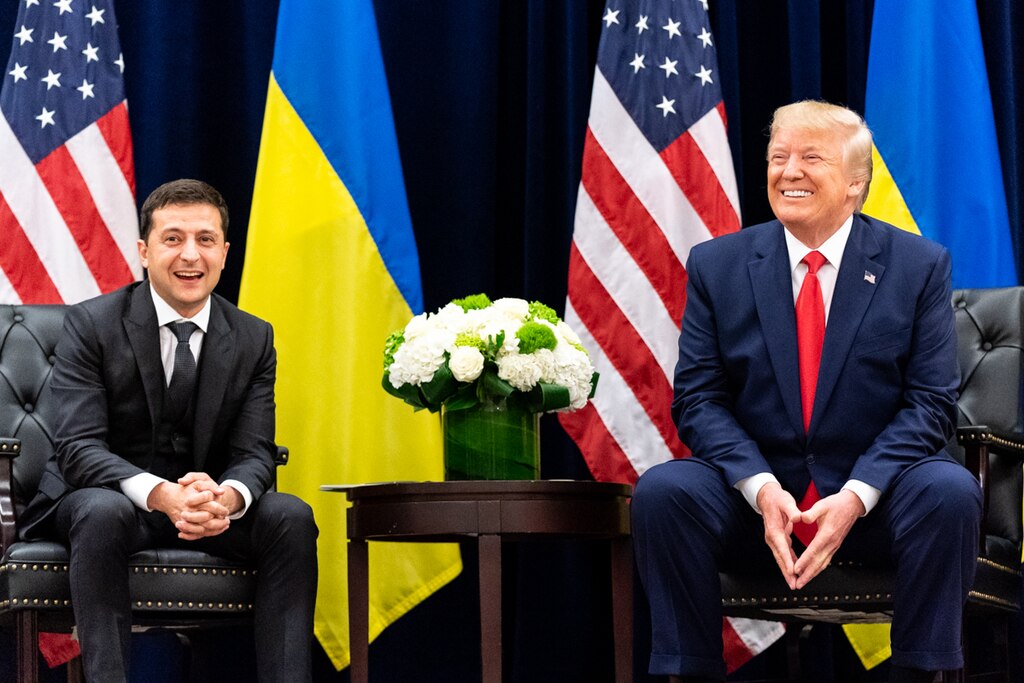Ukrainian President Volodymyr Zelensky has suggested that the war with Russia may end more quickly once U.S. President-elect Donald Trump takes office. In remarks made during a press briefing in Kyiv, Zelensky voiced his belief that the shifting dynamics in global leadership could bring a resolution to the protracted conflict, which has left thousands dead and displaced millions.
Zelensky’s comments come amid escalating tensions in Eastern Europe and growing international scrutiny of the U.S.’s role in global diplomacy under Trump’s expected presidency. While the Ukrainian leader did not elaborate on the specifics of his statement, the implication that Trump’s administration might play a decisive role in resolving the conflict has sparked widespread debate.
Hope or Political Strategy?
Zelensky’s remarks have been met with mixed reactions. Supporters of Trump have seized on the statement as evidence of the former president’s potential to broker peace in one of the world’s most volatile regions. They argue that Trump’s previous foreign policy record, including dialogue with North Korea and improved relations with Russia during his first term, positions him as a leader capable of fostering negotiations.
Critics, however, question whether Zelensky’s optimism is warranted. Skeptics argue that Trump’s rhetoric during the campaign trail—where he emphasized reducing U.S. involvement in international conflicts—could mean a diminished American role in supporting Ukraine against Russian aggression. Some have raised concerns that Trump’s relationship with Russian President Vladimir Putin might complicate the U.S.’s stance on the war.
The War’s Ongoing Toll
The war in Ukraine has entered a grueling phase, with neither side showing signs of significant progress toward a resolution. Russian forces continue their occupation of key territories, while Ukraine, backed by Western allies, has mounted fierce counteroffensives. The conflict has strained global energy markets, disrupted supply chains, and tested the resilience of NATO alliances.
Zelensky’s administration has relied heavily on U.S. military aid and diplomatic support to sustain its resistance against Russia. With Trump’s inauguration looming, questions remain about whether the U.S. will maintain its current level of assistance or push for a new strategy altogether.
What Trump’s Leadership Could Mean
During his campaign, Trump hinted at adopting a pragmatic approach to foreign conflicts, emphasizing “America First” policies. Some analysts speculate that his administration may prioritize negotiations with Russia over continued military aid, potentially altering the dynamics of the conflict.
Zelensky’s comments could also be seen as a strategic move to appeal to the incoming U.S. administration, ensuring that Ukraine remains a priority in Washington’s foreign policy agenda. By expressing confidence in Trump’s leadership, Zelensky may be signaling his willingness to work closely with the president-elect to secure a peaceful resolution.
Global Leaders React
Zelensky’s statement has reverberated across international political circles, with global leaders weighing in on the implications. While some view it as a hopeful sign of progress, others remain skeptical, noting the complex geopolitical factors at play.
For now, the world waits to see how Trump’s administration will approach the conflict in Ukraine—and whether Zelensky’s belief in a faster resolution will materialize.



 Trump Warns Iran as Gulf Conflict Disrupts Oil Markets and Global Trade
Trump Warns Iran as Gulf Conflict Disrupts Oil Markets and Global Trade  Israel Declares State of Emergency as Iran Launches Missile Attacks
Israel Declares State of Emergency as Iran Launches Missile Attacks  Why did Iran bomb Dubai? A Middle East expert explains the regional alliances at play
Why did Iran bomb Dubai? A Middle East expert explains the regional alliances at play  Trump Announces U.S. Strikes on Iran Navy as Conflict Escalates
Trump Announces U.S. Strikes on Iran Navy as Conflict Escalates  EU Urges Maximum Restraint in Iran Conflict Amid Fears of Regional Escalation and Oil Supply Disruption
EU Urges Maximum Restraint in Iran Conflict Amid Fears of Regional Escalation and Oil Supply Disruption  Australia Rules Out Military Involvement in Iran Conflict as Middle East Tensions Escalate
Australia Rules Out Military Involvement in Iran Conflict as Middle East Tensions Escalate  Middle East Conflict Escalates After Khamenei’s Death as U.S., Israel and Iran Exchange Strikes
Middle East Conflict Escalates After Khamenei’s Death as U.S., Israel and Iran Exchange Strikes  Trump to Address Nation as U.S. Launches Strikes in Iran, Axios Reports
Trump to Address Nation as U.S. Launches Strikes in Iran, Axios Reports  Trump Says U.S. Attacks on Iran Will Continue, Warns of More American Casualties
Trump Says U.S. Attacks on Iran Will Continue, Warns of More American Casualties  Argentina Tax Reform 2026: President Javier Milei Pushes Lower Taxes and Structural Changes
Argentina Tax Reform 2026: President Javier Milei Pushes Lower Taxes and Structural Changes  Russia Signals Openness to U.S. Security Guarantees for Ukraine at Geneva Peace Talks
Russia Signals Openness to U.S. Security Guarantees for Ukraine at Geneva Peace Talks  Trump Launches Operation Epic Fury: U.S. Strikes on Iran Mark High-Risk Shift in Middle East
Trump Launches Operation Epic Fury: U.S. Strikes on Iran Mark High-Risk Shift in Middle East  Suspected Drone Strike Hits RAF Akrotiri Base in Cyprus, Causing Limited Damage
Suspected Drone Strike Hits RAF Akrotiri Base in Cyprus, Causing Limited Damage  UK Accepts U.S. Request to Use British Bases for Defensive Strikes on Iranian Missiles
UK Accepts U.S. Request to Use British Bases for Defensive Strikes on Iranian Missiles  U.S. Lawmakers Question Trump’s Iran Strategy After Joint U.S.-Israeli Strikes
U.S. Lawmakers Question Trump’s Iran Strategy After Joint U.S.-Israeli Strikes  Trump Says U.S. Combat Operations in Iran Will Continue Until Objectives Are Met
Trump Says U.S. Combat Operations in Iran Will Continue Until Objectives Are Met  AI is already creeping into election campaigns. NZ’s rules aren’t ready
AI is already creeping into election campaigns. NZ’s rules aren’t ready 































